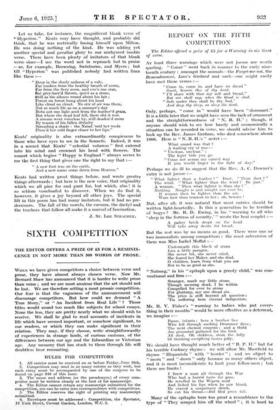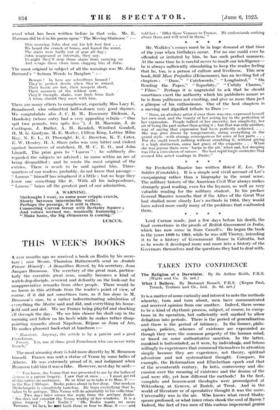REPORT ON THE FIFTH COMPETITION
The Editor offered a prize of £5 for a Warning in si.r lines of verse.
AT least three warnings which were not jocose are worth quoting. " Conar " went back in manner to the early nine- teenth century ; amongst the annuals—the Forget-me-not, the Remembrancer, Love's Garland and such—one might easily have met these verses :- "Come in, come in, and have no dread " Guest, beware thee of thy head.
" I'll share with thee my salt and bread," But one shall sup, when the blood is shed. " Soft under thee shall be thy bed,"
And deep thy sleep, as sleep the dead.
Only, perhaps, " come in " would have been " dismount." It is a little later that we might have seen the lack of ornament and the straightforwardness of " N. B. H." ; though, if anyone should wish to see how barely and economically a situation can be recorded in verse, we should advise him to look up the Rev. James Graham, who died somewhere about 1806. Here is " N. B. H.'s " sestet :- What sound was that ?
A wailing cry of woe- " Unclean, unclean " :
The leper bids you go.
." Come not across my cursed way If you would linger in the light of day."
Perhaps we do ill to suggest that the Rev. A. C. Downer's -entry is not jocose :- "What lighter than a feather ? " Dust. " Than dust ? " The wind. " What lighter than the wind ? Be just."
A woman. " Then what lighter is than she ? " Nothing. Nought is and nought can ever be. If woman then be lighter than the air, Ware how thou trustest to her ; oh, beware !
But, after all, it was natural that most entries should be written light-heartedly. Is this a generation to be terrified of bogy-s ? Mr. R. D. Ewing, in his " warning to all who ' sleep in the fortress of security,' " wrote the best couplet :- A paltry brick dropt on the head Will take away desire for bread.
But the rest was by no means as good. There were one or two immoralists among competitors : the most subversive of them was Miss Isabel Moffat :- Underneath this block of stone Lies a little paragon.
She never bit, she never cried, She feared her Maker, and she died. 0 children, learn from what you see Not to be as good as she.
Nutmeg," in his " epitaph upon a greedy child," was con- ventional and firm :- Stranger, mark my little stone.
Though seeming dead, I lie within Compelled for ever to atone
For gluttony, my one dread sin. The price is stiff beyond all question : 'Tie suffering here eternal indigestion.
Mr. R. V. Fisher's " warning to babies who put every- thing in their mouths" would be more effective as a deterrent, we imagine :—
Pause, infants here a brother lies Who fell through sucking Drummer dyes ;
The next chewed coupons ; and a third Ate groundsel gathered for the bird. All died. Oh children, shun the folly Of thinking everything tastes jolly.
We should have thought much better of " B. P. II." but for his terrible Cockney rhyme: we will allow Mr. Masefiekl to rhyme " Hispaniola " with " bowler " ; and we object to " mom " and " dawn " only because so many others object, and it is most inconsiderate to hurt your fellow-men ;* but there are limits !
I knew a man all through the War Who had a horrid taste for gore. He revelled in the Wipers mud And licked his lips when he saw blood. He craved a sanguinary drink, So cut his throat.—But bled green ink.
Many of the epitaphs bore too great a resemblance to the type of " They scraped him off the wheel " ; it is hard to
excel what has been written before in that vein. Mr. E. Iarman did best in his poem upon " The Moving Staircase " :-
This morning John shot out his left foot first . . . We heard the crunch of bones, and feared the worst. The stairs were badly out of gear all day ; John reappeared at intervals, they say.
To-night they'll stop those stairs from carrying on And scrape them clean from clogging bits of John.
The most original in subject of all the warnings was Mr. John Barnard's " Serious Words to Burglars " :— Beware ! In here are schoolboys housed ! They're perfect devils when they're roused. Their heads are hot, their tempers short, Their manners of the wildest sort.. They'd trample, shake, tear limb from limb A felon, should they meet with him.
There are many others to compliment, especially Miss Lucy E. Broadwood, who submitted half-a-dozen very good rhymes. We congratulate also J. C. B. M., Rosemary Dickson, J„ Hawksley (whose entry had a very appealing refrain—" One spit two pounds, two spits five "), J. H. Macwain, J. de Coetlogon, J. Butler, A. H. Kendall, Winifred Goodall, II. M. G. Gardyne, M. E. Morley, Clifton King, Lettice Milne Ray, N. E. L., 0. Plowright, E. C. Brereton, K. T. Cater, E. W. Hendry, H. A. Shore (who was very bitter and violent against borrowers of matches), H. M. C., E. 0., and John Linnell. The prize goes to " Luscus " : he sublimely dis- regarded the subjects we advised ; he came within an ace of being disqualified ; and he wrote the most original of the entries. There is much to be said against him. Three- quarters of our readers, probably, do not know that passage- " Luseus " himself has misplaced it a little ; but we hope they know one something like it. With all his independence, " Luscus bears off the greatest part of our admiration.
A WARNING.
Methought I went, as some poor cripple crawls, Slowly between interminable walls ; .Perhaps the passage, if it still is there, Connecting Curzon Street with Berkeley Square ; And voices warned me, musically humming :---- "Make haste, the big rhinoceros is coming."
LUSCUS.















































 Previous page
Previous page